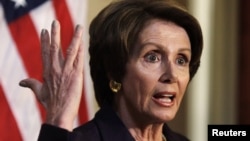WHITE HOUSE —
U.S. President Barack Obama and Republicans in Congress appear to remain far apart in talks to avert the so-called fiscal cliff of $600 billion in automatic government spending cuts and expiring tax cuts. The latest U.S. jobs figures played into the debate.
With days dwindling for a compromise, the Republican Speaker of the House of Representatives, John Boehner, bluntly accused the White House of wasting time and deliberately pushing the economy closer to the precipice.
Boehner says President Obama failed to counter an offer this past week from House Republicans of $800 billion in higher tax revenues, half of President Obama's $1.6 trillion offer as an opening negotiating position three weeks ago.
"Reports indicate that the president has adopted a deliberate strategy to slow walk our economy right to the edge of the fiscal cliff," Boehner said. "Instead of reforming the tax code and cutting spending, the president wants to raise [tax] rates. But even if he got the tax rate hike he wanted, understand we would continue to see trillion dollar deficits for as far as [the] eye can see."
Boehner described his latest telephone conversation with Obama as pleasant but "more of the same" and accused the president of adopting a "my way or the highway" approach.
What is the U.S. Fiscal Cliff?
President Obama insists that expiring Bush-era tax cuts be extended for those earning $250,000 or less, but is firm that wealthier Americans need to pay more to support deficit reduction.
A key issue under discussion is the specific level below Clinton-era rates for top income earners that would be set by any compromise.
Vice President Joe Biden said the White House will respond to "any serious offer" and said the issue of extending middle class tax cuts should be separated from tax levels for the wealthy.
"Do not hold hostage the relief for the middle class because you insist that 120,000 families get a $500 billion tax cut over the next 10 years," he said.
Before a meeting with President Obama on Friday, House of Representatives Democratic minority leader Nancy Pelosi spoke on Capitol Hill.
"As long as they will not touch one hair on the head, or get one red cent from the high end [earners], we will never have the revenue necessary to combine with the savings and with the spending cuts to reduce the deficit, to create jobs, to grow the economy, to improve the lives of the American people," she said.
Economists warn that failure to reach a compromise will slow the U.S. economy in the new year. The hope is for a "down payment" agreement that would set the stage for much broader deficit and debt negotiations in 2013.
Playing into the debate on Friday were the latest government jobs figures showing 146,000 jobs added to the economy, and a drop in overall unemployment from 7.9 to 7.7 percent.
Asked if Republicans are concerned that failure to reach a compromise with the president could harm job growth, Boehner said it is Obama who is risking such damage by insisting on higher taxes for wealthier Americans.
The White House called the latest employment report, showing the 33rd straight month of private sector job increases, further evidence the economy continues to heal from the recession that began in 2007.
With days dwindling for a compromise, the Republican Speaker of the House of Representatives, John Boehner, bluntly accused the White House of wasting time and deliberately pushing the economy closer to the precipice.
Boehner says President Obama failed to counter an offer this past week from House Republicans of $800 billion in higher tax revenues, half of President Obama's $1.6 trillion offer as an opening negotiating position three weeks ago.
"Reports indicate that the president has adopted a deliberate strategy to slow walk our economy right to the edge of the fiscal cliff," Boehner said. "Instead of reforming the tax code and cutting spending, the president wants to raise [tax] rates. But even if he got the tax rate hike he wanted, understand we would continue to see trillion dollar deficits for as far as [the] eye can see."
Boehner described his latest telephone conversation with Obama as pleasant but "more of the same" and accused the president of adopting a "my way or the highway" approach.
What Is the US Fiscal Cliff?
What is the U.S. Fiscal Cliff?
- An agreement intended to force politicians to compromise and make deals.
- Without a deal by January 1, 2013, sharp spending cuts would hit military and social programs.
- Tax hikes also would go into effect.
- The combination would reduce economic activity, and could boost unemployment and push the nation back into recession.
A key issue under discussion is the specific level below Clinton-era rates for top income earners that would be set by any compromise.
Vice President Joe Biden said the White House will respond to "any serious offer" and said the issue of extending middle class tax cuts should be separated from tax levels for the wealthy.
"Do not hold hostage the relief for the middle class because you insist that 120,000 families get a $500 billion tax cut over the next 10 years," he said.
Before a meeting with President Obama on Friday, House of Representatives Democratic minority leader Nancy Pelosi spoke on Capitol Hill.
"As long as they will not touch one hair on the head, or get one red cent from the high end [earners], we will never have the revenue necessary to combine with the savings and with the spending cuts to reduce the deficit, to create jobs, to grow the economy, to improve the lives of the American people," she said.
Economists warn that failure to reach a compromise will slow the U.S. economy in the new year. The hope is for a "down payment" agreement that would set the stage for much broader deficit and debt negotiations in 2013.
Playing into the debate on Friday were the latest government jobs figures showing 146,000 jobs added to the economy, and a drop in overall unemployment from 7.9 to 7.7 percent.
Asked if Republicans are concerned that failure to reach a compromise with the president could harm job growth, Boehner said it is Obama who is risking such damage by insisting on higher taxes for wealthier Americans.
The White House called the latest employment report, showing the 33rd straight month of private sector job increases, further evidence the economy continues to heal from the recession that began in 2007.






